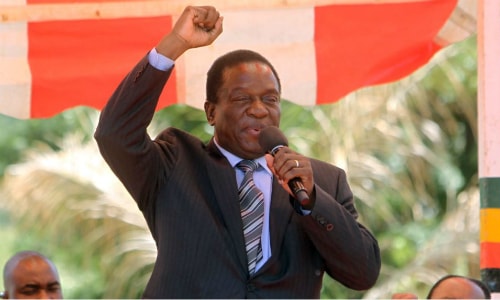Former Vice President 'Crocodile' at the Center of Mutiny
Zimbabwe's former vice president has close ties with the military and is said to know how to wait for the right time to act.
 |
| Former Zimbabwean Vice President Emmerson Mnangagwa. Photo: AP. |
Former Zimbabwean Vice President Emmerson Mnangagwa once explained his nickname "Crocodile" by saying: "They strike at the right moment," according to the NYTimes.
Mnangagwa, who was Zimbabwe's vice president until he was fired last week, is likely to become the country's new leader, after the military staged a coup and placed President Robert Mugabe under house arrest on November 15. Mnangagwa returned home yesterday after nearly a week abroad.
Mnangagwa was born in 1942 in the mining town of Zvishavane. His father was a farmer who was heavily involved in politics. Mnangagwa received military training in China and Egypt.
As a teenager, Mnangagwa joined the movement to liberate Rhodesia, Zimbabwe's name during British colonial rule. At 16, Mnangagwa was sentenced to 10 years in prison for his part in a plot to bomb railways. While in prison, Mnangagwa studied law and politics. He later earned a law degree from the University of Zambia.
After his release from prison, Mnangagwa joined the liberation movement in Mozambique (then a Portuguese colony), where he met Robert Mugabe and became his aide and bodyguard. Mnangagwa was a commander in the guerrilla war in the 1970s against the authoritarian white government. He stood by Mugabe as they conducted political negotiations with the white government, leading to the creation of the internationally recognized Republic of Zimbabwe in 1980.
While running the Central Intelligence Agency in the 1980s, Mr Mnangagwa was accused of orchestrating a campaign known as Gukurahundi, in which thousands of political opponents and civilians from the Ndebele ethnic group were killed. However, Mr Mnangagwa denied the accusations.
Mnangagwa has held several key positions in government, including defense minister and justice minister. He is seen as central to the network connecting the military, intelligence agencies and the ruling party.
Like his political rival, First Lady Grace Mugabe, Mr Mnangagwa has not always been popular. He has lost his seat in parliament at least twice, once after being accused of throwing petrol bombs at a rival's home.
In recent years, Mr. Mnangagwa has tried to make amends for the past. He has portrayed himself as a supporter of agricultural reform and a proponent of efforts to restore Zimbabwe’s relationship with foreign investors and international organizations, including the International Monetary Fund and the World Bank.
In 2014, when Mr Mugabe fired Vice President Joice Mujuru after First Lady Grace accused her of treason – similar to Mnangagwa’s current situation – Mr Mnangagwa supported the President’s decision. Ms Mujuru then formed an opposition party and Mr Mnangagwa took over as vice president.
"He's not called the Crocodile for nothing," said South African journalist Peter Fabricius. "He didn't form another opposition party or leave politics to make more money, as many people think," Fabricius said.
Mr Mnangagwa’s relationship with President Mugabe began to deteriorate this year, after Mrs Mugabe increasingly expressed her ambition to succeed her husband. She accused Mr Mnangagwa of trying to undermine her husband’s power, split the party and plot a coup. Mr Mnangagwa was removed from office on November 6.
No one knows for sure where Mnangagwa's nickname "Crocodile" comes from. Some say it's a wartime alias, others say it comes from his surname.
In a telephone interview, Victor Matemadanda, a former subordinate of Mr Mnangagwa, commented on the nickname.
"The crocodile is patient, waiting for his target, pretending to be a rock," he said. "Sometimes you think he doesn't react or doesn't have a solution to what's happening. He doesn't get upset until he gets the best opportunity to strike. And when he does, he doesn't miss," Matemadanda said.
According to VNE
| RELATED NEWS |
|---|

